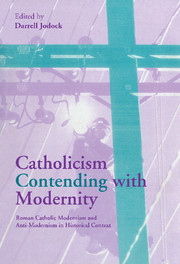 Catholicism Contending with Modernity
Catholicism Contending with Modernity Published online by Cambridge University Press: 30 October 2009
Friedrich von Hügel (1852–1925) and Maude Petre (1863–1942) were deeply committed Roman Catholic lay persons who saw the need for reform in the Catholic Church and worked toward that end. They did so while maintaining a remarkable openness to members of other Christian churches and other religions. Each spent considerable time in France and Italy, but for both England was home. Petre belonged to an old English Catholic family, while von Hügel, who had been born in Florence and remained an Austrian citizen until 1914, lived most of his life in England. The church was the primary focus of their lives and their writing. Both were major actors in the development of what became known as Roman Catholic Modernism and particularly in the drama surrounding George Tyrrell's brief and brilliant career and untimely death.
This paper focuses on English Catholicism between 1890 and 1910, crucial years in the history of the Catholic Church in England and in the lives of both von Hügel and Petre. During these transitional years, that church was coming to a new sense of itself. It ceased to be a “missionary outpost” and became “more Roman.” Against this changing background von Hügel and Petre resolutely maintained their Catholic identity. While some have considered them to be only marginally Catholic, they considered their lives to be shaped decisively by their Catholicism. Although both were uncomfortable with the form English Catholicism was taking between 1890 and 1910, their understanding of Catholicism was broad enough and deep enough to sustain their Catholic identity – an identity that was at once both critical and faithful.
To save this book to your Kindle, first ensure [email protected] is added to your Approved Personal Document E-mail List under your Personal Document Settings on the Manage Your Content and Devices page of your Amazon account. Then enter the ‘name’ part of your Kindle email address below. Find out more about saving to your Kindle.
Note you can select to save to either the @free.kindle.com or @kindle.com variations. ‘@free.kindle.com’ emails are free but can only be saved to your device when it is connected to wi-fi. ‘@kindle.com’ emails can be delivered even when you are not connected to wi-fi, but note that service fees apply.
Find out more about the Kindle Personal Document Service.
To save content items to your account, please confirm that you agree to abide by our usage policies. If this is the first time you use this feature, you will be asked to authorise Cambridge Core to connect with your account. Find out more about saving content to Dropbox.
To save content items to your account, please confirm that you agree to abide by our usage policies. If this is the first time you use this feature, you will be asked to authorise Cambridge Core to connect with your account. Find out more about saving content to Google Drive.